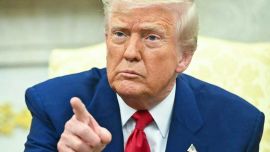Various explanations could be offered for the old joke: “Argentina is a land of the future, always has been and always will be, “ of which one might be simply to ask how can a country have a future when it has such an all-absorbing present? A present which keeps the New England economist Dr Hale writing week after week:
“Thanksgiving is still a good three months away but it’s already time to talk Turkey. It might be presumptuous to say that I’d be the last person in the world to defend Donald Trump – there must surely be huge (to use his favorite word) competition to be at the head of that queue (or should I say tail?) – although I’d be supremely honored if that were so but I do think he’s been given a bum rap in the prevailing media trend to blame him for the Turkish crisis. Attributing the Turkish collapse to tweeted threats to raise steel and aluminium tariffs when these new levies have been around since March is simplistic to say the least. Turkey is basically paying the price for being a highly vulnerable emerging market and when we’re talking highly vulnerable emerging markets, we’re also talking Argentina.
Nothing especially original in my curiosity as to what’s going on down there – my questions pretty much write themselves. Will the dollar find its next equilibrium above or below 30 pesos? And can it be a coincidence that this week’s financial and fiscal measures (which you might explain to me more fully) come with a International Monetary Fund (IMF) team headed by Roberto Cardarelli in town? And do all the graft exposés at the top of the news add vulnerability or credibility?»
My reply :
“No doubt you have found some brains to pick in Ankara or Istanbul so I’ll stick to Argentina. About Turkey I would confine my remarks to saying that it must be depressing here to see a G20 member crash when it has had strong and steady growth since the 2008-9 global meltdown until now (whereas Argentina has had negative growth in every non-electoral year since the bicentennial 2010, a trend which looks like continuing this year) while its inflation last year was almost single-digit. While I always stand to be corrected by your Turkish experts, it looks to me like Turkey could be heading down the road of capital controls (limiting international transactions to half a bank’s capital) and that solution is simply not an option for Argentina from the way the cepo currency clamp imposed throughout the second term of Cristina Fernández de Kirchner (2011-15) pulverised exports.
“Talking of exports, I think that the fiscal deficit is often overrated as Argentina’s central problem. If Turkey is even more in the red with both its budget and balance of payments (six percent of gross domestic product), this easily accounts for its vulnerability now but does not explain how it grew so steadily throughout this decade. At least two other factors are equally responsible for Argentina’s dependence on external financing – the feeble exports (barely two-thirds of the US$ 83 billion at the start of this decade) and stunted domestic capital markets (only 14 percent of GDP when they outstrip the economy in most of the Latin American region, never mind the rest of the world). Verbally committed to export-led growth, the Maurcio Macri administration took a step back this week with Tuesday’s announcement of the suspension of the phased reduction of soy byproduct export duties for the next six months (during when a bumper harvest is forecast), as well as slashing export reimbursements by two-thirds.
“Since you ask about the IMF, its hand is widely seen there as prevailing over Macri’s aversion to export duties. Less clearly on the financial side. The government and the IMF are now on the same page over the urgency of defusing the Lebac time-bomb, overcoming the ambiguity of previous Central Bank governor Federico Sturzenegger (who also saw the dangers of snowballing interest rates but had problems finding a better alternative for ‘sterilising’ or absorbing peso liquidity and taming inflation). But whereas the IMF would like to have it both ways – dismantling Lebacs without detriment to Central Bank reserves – the government cannot see a way to reshuffling its bond portfolio without greater flexibility for intervention (which the IMF seeks to limit to US$2 billion).
“So what happened on Tuesday? A strong signal was sent toward dethroning Lebacs as the main financial instrument with the lowest renewal in 20 months – at the start of the week the Central Bank set a cap of 230 million pesos on the 330 million falling due (over half a billion according to some criteria) and ended up renewing only 201 million (even the offers fell short of the cap at 213 million as investors are starting to realise that Lebacs are no longer the flavour of the month). At the same time the interest rates were trimmed from last month’s 46.5 to 45 percent. Yet the danger then arises that all pesos not finding a bond destination will end up chasing the dollar so the government is looking for alternatives. The dollar-linked Lete Treasury bonds are exposed to the risks of devaluation – a peso version is thus being contemplated.
“Finally, you ask whether the big noise over Kirchnerite corruption will do more harm or good. In the immediate term it is highly disruptive – all the more so because it is open-ended with any number of reputable companies previously trapped in a corrupt system having cause to tremble. Yet in a longer term the country surely stands to gain if this means the death of crony capitalism and the start of public works which improve a hopelessly outdated infrastructure instead of serving as slush funds for political machines (whose funding also needs to be cleaned up). Even if public works are now a prime casualty of austerity. Public-private partnerships are presented as the solution here but these are tricky – PPP can often stand for ‘plenty of passing the parcel’ at the best of times, never mind Argentina’s current situation with an insolvent state and a suspect (and suspicious) business class.
“So much more remains to be said about all this but I
have to run, Dr Hale – I cannot spend all my time satisfying
your curiosity.” related news




















Comments